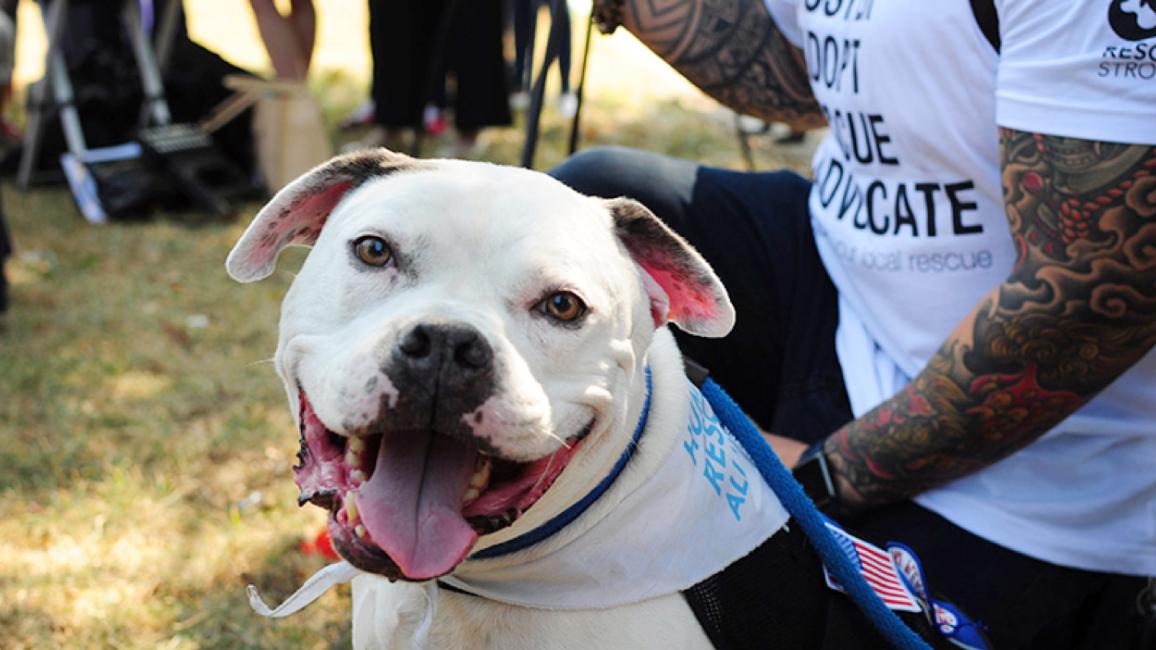Hundreds rally to fight pit bull ban in Maryland, but will it be enough?

Chompers is the kind of pup we all hope for when we bring a new family member home: kind, easygoing, good with everyone and everything and, best of all, a total love-bug. He lives with my mother-in-law in a community outside of Denver, Colorado, a transplant from a Texas shelter. Since arriving a few years ago, he’s really taken to the Colorado lifestyle, eschewing his cowboy roots for the “chillness” of mountain life.
For years, Chompers was the ying to his late brother Dempsey’s yang (truth be told, Dempsey, a boxer-like mutt, was a total doofus and troublemaker). In other words, he’s the perfect dog in every possible way. But Chompers lives a few miles from an imaginary line that for decades has served as a boundary between life and death.
Pit bull ban in Denver and other communities
That’s because Chompers appears to be a pit-bull-terrier-type dog. If he lived in Denver, which has a long-standing ban on dogs who look like him, he’d be at risk of being seized and killed. For my mother-in-law, the choice is clear and obvious: She opts to live in a community where Chompers can be the loving and spoiled pet he was destined to be.
Sadly, that option isn’t always available for people, and it’s a big part of why breed-specific and breed-discriminatory laws need to be repealed. And while we will continue to fight alongside you to repeal the ban in Denver, we’re seeing increasingly hopeful signs in another community about 1,700 miles to the east.
Prince George’s County, Maryland
While not as well known as the Denver law, a similar type of breed ban exists in Prince George’s County, Maryland. In fact, the massive county right outside of Washington, D.C., has a population that’s about 50% larger than Denver’s and a long, tragic history of killing innocent pets.
Since the ban went into effect more than two decades ago, the county has seized and killed thousands of dogs who looked like Chompers — not for any dangerous behavior or anything they did, but because of this archaic law. That’s thousands of families who have been shattered and untold thousands of friendly dogs who could have found homes but didn’t because of the ban. It’s also worth noting the enforcement costs to the county: millions of taxpayer dollars over the years.
That could all be changing soon, however. On October 1, I had the privilege of joining more than a hundred passionate advocates at a rally right on the border between D.C. and the county. We chose the location to highlight the absurdity and arbitrariness of the ban. On one side of the road, the dogs in attendance were loving pets, therapy and service dogs, and loyal companions. On the other side, they immediately become contraband and risk an unknown fate.
We were there alongside our colleagues and friends from the Humane Society of the United States, the Humane Rescue Alliance, the SPCA/Humane Society of Prince George’s County and countless others who stood arm-in-arm to call for an end to this discriminatory law.
As I always am, I was amazed at the tireless advocacy of all the people who do this type of work professionally. Even more heartening for me were the people who took time out of their busy workdays to come and voice their passion for this cause, these dogs and their people.
We were loud, we were organized, we had fun, and we were united. Every single advocate, whether he or she worked with one of the organizations or not, was there to send a message to the county: We are not going to stop until the ban is repealed.
Animal control ordinance review
The Prince George’s County council is in the process of reviewing legislation aimed at modernizing its animal control ordinance. There is an organized coalition of advocates, including all the organizations that came to the rally and more, who have been working with the council to include a repeal of the ban in that effort.
The council members are hearing from constituents; they’re hearing about how the science on this topic is now settled and how all of the research has conclusively found that breed-discriminatory laws simply do not work. Effective public safety laws need to be breed-neutral, and they need to hold all dogs and dog owners accountable for their behavior, no exceptions.
Repealing breed-discriminatory ban
It’s now our responsibility to let these elected officials know that the time is right to include a repeal of the ban. It’s time to look at the data, to look at the research and to finally treat all dogs as the individuals they are.
This should be settled one way or the other within the next month or two. It really is going to come down to numbers: Will our supporters organize and use their voices? Or will we be drowned out by the “truthers” who continue to make false and inaccurate assertions about the efficacy of these laws?
I believe that we can win this. In fact, I know we can, but it’s time for a full-court press. We need to reach as many Prince George’s County residents as possible and we need them to speak out. Not everyone was able to join us at the rally, but everyone can still lend their voices for our pet dogs.
If you know people who live in Prince George’s County, please share our legislative alert with them and urge them to take action. Let them know that dogs like Chompers are counting on us to stand up and be heard.
